For Westside Housing Organization, "ground zero" is a home on Norton Avenue in Kansas City, Missouri. Westside Housing renovated and beautified the home, which needed multiple repairs, and made it affordable and sustainable for a woman who was caring for her brother, a disabled veteran, and her daughter, who has special needs.
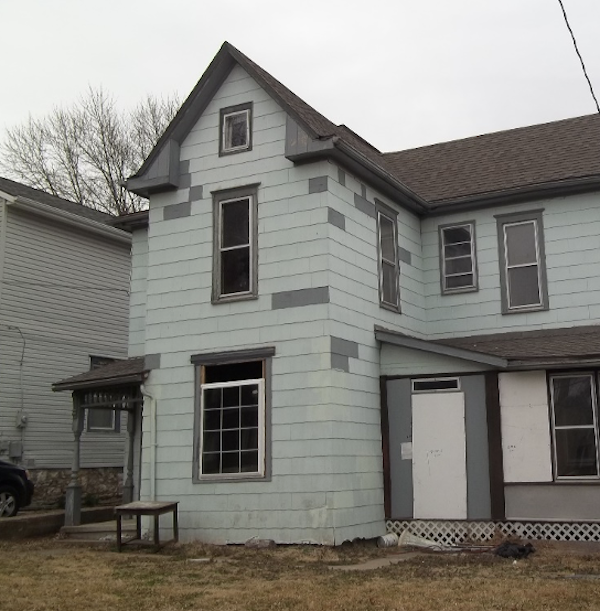
"It created a really unique front yard," Adams-Leavitt says. "And that's what got us started on our native plants program."
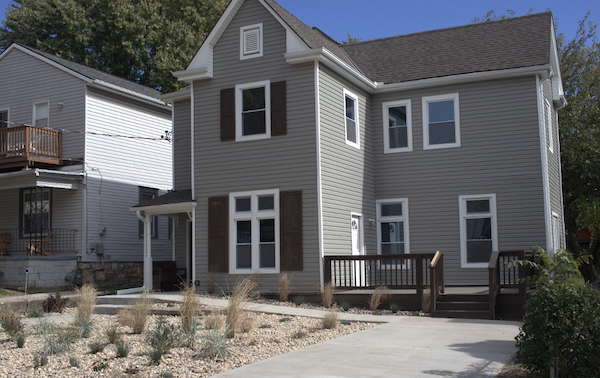 House and yard after Westside Housing worked on the property.
House and yard after Westside Housing worked on the property.

Once they've been established, native plants don't require as much care as exotic plants. "It's different from roses, for example, that are always saying ‘feed me, feed me,'" Adams-Leavitt says.
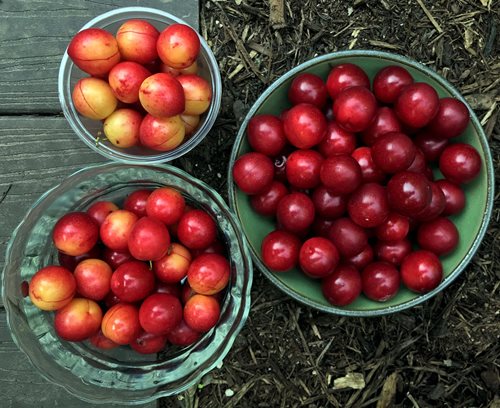 Native plants establish a strong root structure and help with everything from storm runoff to pollination. This spring, Westside Housing is planning to xeriscape the old fire station in town, which serves as their office building. They're also looking to transform a mixed-use property in Kansas City that will house both residents and commercial businesses. The property has a big yard that will be filled with native plants. The landscaper, Adams-Leavitt says, sees the property as a canvas.
Native plants establish a strong root structure and help with everything from storm runoff to pollination. This spring, Westside Housing is planning to xeriscape the old fire station in town, which serves as their office building. They're also looking to transform a mixed-use property in Kansas City that will house both residents and commercial businesses. The property has a big yard that will be filled with native plants. The landscaper, Adams-Leavitt says, sees the property as a canvas. But there's another way Westside Housing is effecting change in the community through native plants. This spring, the organization is partnering with the the Missouri Prairie Foundation's Grow Native program and Lincoln University, a historically Black university (HBCU) with campuses in Jefferson City and Kansas City, to launch the Native Plant Academy, in an effort to teach Westside residents about plants native to the Kansas City region. The goal is to recruit young people – high school age and young adult – with a focus on residents in the urban core. They'll learn more about native plants through a series of workshops, which will be taught in both English and Spanish. At the end of the series, graduates will be invited to apply for internships at horticulture-related organizations.
The courtyard in front of Nottingham Apartments, a Westside Housing apartment community, will be one of the classrooms. The program was initially scheduled for last spring, but the organization decided to postpone in the initial stages of the COVID-19 pandemic. Adams-Leavitt says they considered holding the class virtually, but with horticulture, "you just want to get your hands in the dirt." 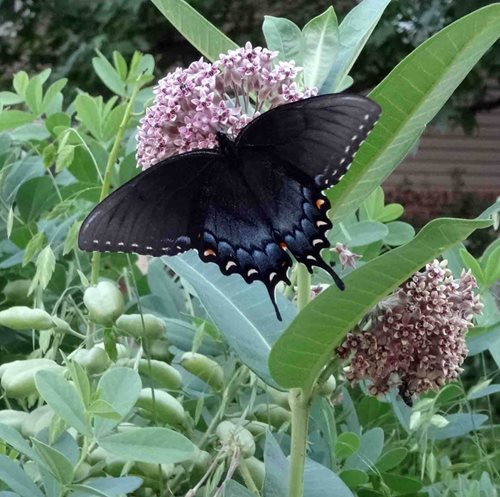

Westside Housing has a commitment to equity in the services they provide and has been intentional about hiring bilingual staff and supporting bilingual programs. Adams-Leavitt says 35% of the people in the communities they serve are Latinx. "In our affordable housing, the percentage is much higher and there are many non-English speaking people." While the Native Plant Academy is open to all urban core residents, Westside Housing Organization was particularly interested in the leaders' plan to deliver the class in a bilingual fashion. "That means the information is accessible to all people in our community," Warren-Leavitt says. "That's the kind of program we want to get behind!"
Spring is a good time to learn about plants that are indigenous to Missouri, says Nadia Navarrete-Tindall, a native plants state specialist and an associate professor at Lincoln University and Grow Native Program advisor. Navarrete-Tindall will be leading the academy with Westside Housing participants. She says the academy wanted to reach out to under-represented groups in horticulture, including low-income individuals, women and minorities, in the hopes that they could bring back what they learned to their communities. Some, she hopes, will find careers in horticulture. Others may use their new knowledge of native plants to grow specialty crops for their own consumption or for local restaurants.
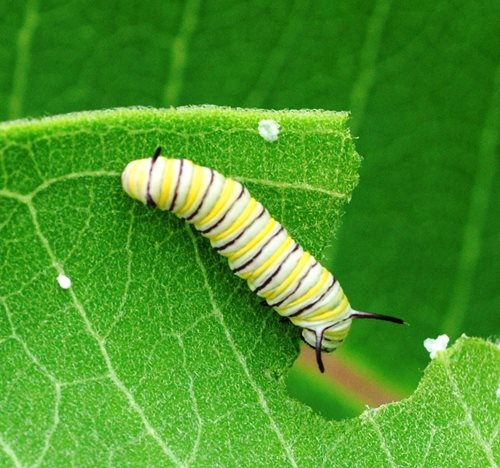 "We promote as much as we can the importance of the indigenous vegetation we once had," she says, speaking just before Earth Day, an April 22 celebration of the Earth and its natural resources – and a call to protect those resources. "By bringing more native plants, we will be improving the habitat." That goes for everything from providing more plants for pollinators to creating more breathable air. "We're trying to help people understand that native plants can be good not only for the wildlife but also for people," she says.
"We promote as much as we can the importance of the indigenous vegetation we once had," she says, speaking just before Earth Day, an April 22 celebration of the Earth and its natural resources – and a call to protect those resources. "By bringing more native plants, we will be improving the habitat." That goes for everything from providing more plants for pollinators to creating more breathable air. "We're trying to help people understand that native plants can be good not only for the wildlife but also for people," she says.In Kansas City, native plants include various grasses and sedges, vines such as passion flower vine, milkweed, a vital food source for monarch butterflies, and edibles like persimmons, paw-paws, wild plums, wild leeks, ground cherries and ground nuts ("they're like small potatoes," Navarrete-Tindall says).
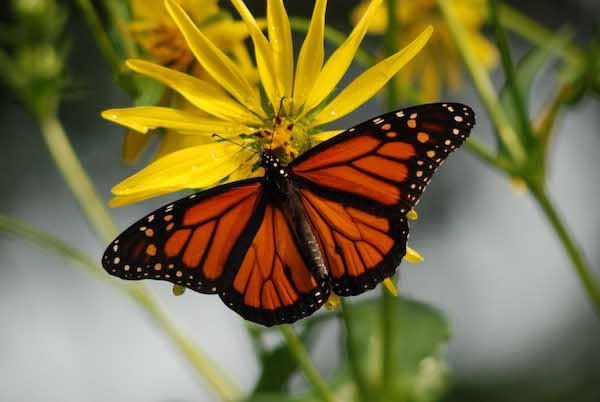
"There are so many opportunities," Farnsworth adds. "They have the apartment complexes and the land. They have condominiums and duplexes. What I love about this program is that it's a chance to enhance career opportunities for marginalized communities. It enhances relationships between the business owners and the people coming to our class."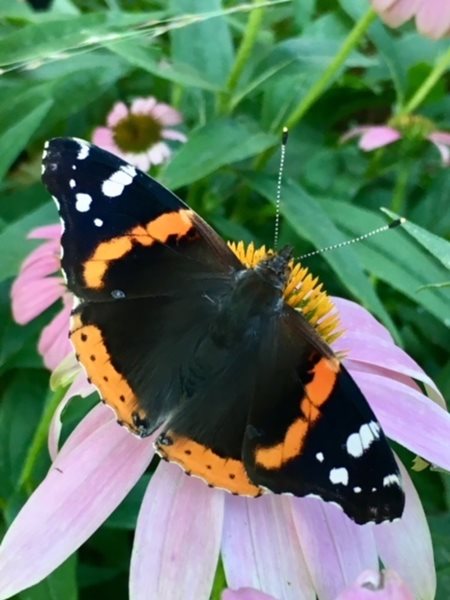

Mentors will work with the students, and landscapers will talk about planning what to plant. "People make the mistake of thinking that you can plunk something into the ground and provide no maintenance at all," Farnsworth says. In fact, she says, the first three years after a native plant is in the soil may require almost as much work as exotic plants. But after those years, the maintenance drops significantly. And the plants won't require as much water or fertilizer because they're acclimated to the soil and the climate of the area.
There are many benefits to growing native plants.
- They have strong root systems and are helpful in stormwater management.
- They produce food.
- They are used to the climate and require less water/fertilizer.
- They are perennials, meaning they grow back year after year.
- Many are codependent with native pollinators, including butterflies
Farnsworth says the partnership with Westside Housing is helping her organization not only reach residents but reach housing-related groups like developers and other stakeholders. Working with Hispanic Community Development Corporation and other professional organizations means the program will live beyond the initial six classes. And working with the community at Westside Housing gives those working on lessons and programming a chance to ask: What do you want? What do you need?
"We can ask, ‘How can we help you with career development, with feeding yourselves, with supplying your restaurants? We can help in myriad ways that we don't even know about yet," Farnsworth says.
"We can ask, ‘How can we help you with career development, with feeding yourselves, with supplying your restaurants? We can help in myriad ways that we don't even know about yet," Farnsworth says.
Navarrete-Tindall says the mentors for the academy are a diverse and inclusive group. "We're hoping at the end, the internship will have people of all different colors; that it will be a diverse group of people to help us encourage others to get involved in this work."
The area outside of Nottingham Apartments includes space for raised beds, and the building is connected to an area they'd liked to see turned into a greenway, Farnsworth says. Already, they're looking for new grants to keep the program going. "There's so much opportunity to transform."
The transformation, she hopes, will be not just with the garden but with the community. Native plants, she says, "are not just about a pretty landscape."
Clare Rosenberger, director of real estate programs for NeighborWorks America, says that the national nonprofit has designated at least 95 network organizations as green organizations. "Along with the green benefits, xeriscaping is fantastic because the plants are appropriate for the climate," she says, in emphasizing Westside Housing's work. "There are so many co-benefits. You're not using chemicals for fertilizer. There's the stormwater management for the property. There are positive impacts on the health of the residents and the community."
NeighborWorks network organizations see the benefits of promoting environmental stewardship beyond their properties, too, she says. Contributions from the network range from adding solar panels to apartment communities to working with residents to purchase green vehicles to planting neighborhood gardens. It's especially important to have such projects in urban areas, where there's more concrete and less of a green canopy. Projects like the one at Westside Housing can have an impact for years to come.
To register for the Native Plant Academy, visit the Grow Native!

